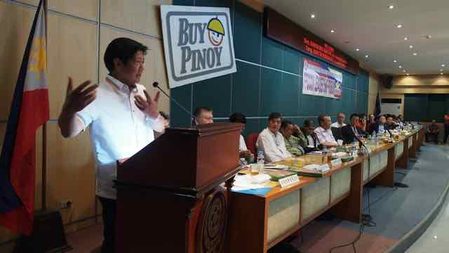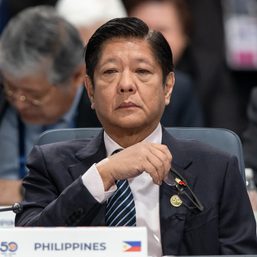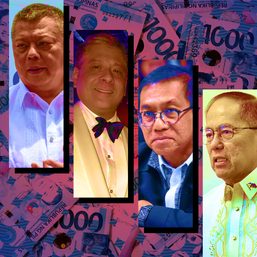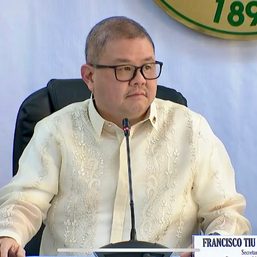SUMMARY
This is AI generated summarization, which may have errors. For context, always refer to the full article.
![[The Slingshot] BBM appoints his own brother in-law](https://www.rappler.com/tachyon/2023/06/TL-BBM-appoints-brother-in-law-June-22-2023.jpg)
Is it a case of an inherited family trait? The Marcos family record of appointing family members was appalling: the dictator appointed his conjugal half as governor of Metropolitan Manila, and later as Minister of Human Settlements, a cabinet position. FM also appointed his daughter as chair of the Sangguniang Kabataan.
Nepotism is generally seen as unethical, at the very least. At its worst, it is a form of corruption and abuse of authority. The best example was Pacifico Marcos. In 1971, his dictator brother appointed him as the first chair of the Philippine Medical Care Commission, the forerunner of today’s PhilHealth. Pacifico sat in that position for 12 long years. Indeed, “there is no ladder to climb when the top rung is reserved for people with a certain name,” once said Forbes.
By the time his dictator brother was ousted from absolute power, Pacifico Marcos was said to have owned shares in about 50 corporations, a large car dealership, the Consolidate Sugar Corporation which ran a sugar mill, a real estate firm called Citizens Development Inc., and a company called Philippine Seed Inc.
Is the Marcos trait of treating government like a small, family-run business the same template the son is now resurrecting?
The announcement appeared to have been hushed. There was no Palace press release about it. The only public announcement came from the government-owned corporation itself, the Phividec Industrial Authority based in Misamis Oriental in Mindanao. The Official Gazette gives us the elongated full name of that government corporation: the Philippine Veterans Investment Development Corporation (Phividec) Industrial Authority. The June 6, 2023 announcement on the official PIA website, the only such government statement on the appointment, was brisk:
“President Ferdinand Romualdez Marcos Jr. has appointed Atty. Joseph Donato J. Bernedo as PHIVIDEC Industrial Authority’s Administrator and CEO for a term of three (3) years. Atty. Bernedo’s experience in the legal profession has spanned to more than 2 decades working for SGV and Company as well as in Romulo Mabanta Buenaventura Sayoc & De los Angeles Law Office, one of the oldest law firms in the Philippines. Atty. Bernedo has represented both Philippine and foreign clients in various cases involving Litigation, Arbitration, General and Corporate Law, and Labor.”
In fact, the announcement leaves out one very important detail of legal curiosity: Joseph Donato Bernedo is the husband of presidential sister Aimee Marcos. Known to family and friends as Cid, the new appointee and his wife and son have been residents of Cagayan de Oro for quite some time. Aimee Marcos and their son were present in the Malacañang oath-taking before Executive Secretary Lucas Bersamin.
His legal background notwithstanding, Bernedo’s main qualification appears to be his affinity to the appointing authority. The former does not justify the latter. Nepotism is partiality to family and relatives for government-paid employment. There is no other definition.
It is a well-studied fact that the malpractice of nepotism leads to monopolization of power. Merit and fairness are not its main drivers. What could be the significance of the Phividec Industrial Authority to the Marcoses?
The PIA is a fully government-owned and -controlled corporation created by Marcos’s Presidential Decree 538 on August 13, 1974. It is mandated to identify and develop sites in the country as prospective industrial areas. Its 3,000-hectare site in the towns of Tagoloan and Villanueva in Misamis Oriental is one of the largest industrial estates in the Philippines. Its biggest infrastructure is the Mindanao Container Terminal, which handles domestic and international containerized cargo. The Bernedo appointment can give the Marcoses a substantial Mindanao foothold in forthcoming elections.
We are not lacking in laws with particular references on nepotism.
Article IX(B) Section 2(1) of the 1987 Philippine Constitution lays out the predicate: the civil service includes government-owned or -controlled corporations. Section 2(2) is the reference to nepotism: “Appointments in the civil service shall be made only according to merit and fitness to be determined, as far as practicable, and, except to positions which are policy-determining, primarily confidential, or highly technical, by competitive examination.”
In fact, this constitutional provision has been further enabled by legal refinements. Foremost among these is Executive Order 292 or the Administrative Code of 1987 that serves as an imperative guideline of the Civil Service Commission. Book V, Title I(A), Chapter 8, Section 59 of that Code prohibits nepotic appointments or those made in favor of a relative of the appointing or recommending authority. The Code qualifies “relative”: those related within the third degree of consanguinity (relationship by blood) or affinity (relationship by marriage) such as spouse (1st degree), children (1st degree), sibling (2nd degree), nephew and niece (3rd degree), and uncle and aunt (3rd degree). “Degree” covers both consanguinity (blood relation) and affinity (related by marriage). Given this legal tenet, Bernedo is the president’s second-degree relative. He falls under the prohibited category.
Let us read that legal principle again that defines nepotism: “All appointments in the national, provincial, city, and municipal governments or in any branch or instrumentality thereof, including government-owned and -controlled corporations, made in favor of a relative (within the third degree) of the appointing or recommending authority, or of the chief of the bureau or office, or of the persons exercising immediate supervision over him, are hereby prohibited.”
The Local Government Code of 1991 goes even further than the CSC. Under its Section 79, the prohibition extends to the appointing or recommending authority’s relatives within the fourth degree of consanguinity or affinity, such as first cousin or first cousin-in-law (4th degree).
Maria Ela Atienza, the UP Diliman political science professor, emphasizes that principle: “The task of the President is to professionalize government institutions and procedures for the benefit of Filipinos, not make public service a family affair.”
The opposite of nepotism is impartiality in the name of the public good. Can a Marcos be capable of that lofty virtue? Or are they operating under the street lingo “sanaol”: government for all in the Marcos family? – Rappler.com
Antonio J. Montalván II is a social anthropologist who advocates that keeping quiet when things go wrong is the mentality of a slave, not a good citizen.
1 comment
How does this make you feel?






Thanks to this article’s writer Antonio J. Montalvan for this revelation. Indeed, the media coverage of such appointment more likely intentionally missed out the Family Relations information. I believe Filipinos are not be surprised of the abused done by their politicians through nepotism or they may not be concern at all about it as long as they can benefit from it through Political Patronage. And about the Civil Service Commission, whose head is also a Presidential Appointee – he will most likely pretend to be blind, deaf and mute about this issue of Nepotism. This is one of the evil results of the Presidential Appointment process.